Before the age of pop and rock stars, classical music had its own "rock stars". Franz Liszt was one of these. An amazingly accomplished piano player, he played romantic pieces before adoring crowds who threw flowers at him.

Liszt: The Genius Who Composed the Hungarian Rhapsody
Franz Liszt was a Hungarian composer and pianist of the Romantic era. Some consider him the greatest virtuoso pianist of all time.
Liszt's Life
Franz Liszt was born in Raiding, Hungary. He was born into a musical family and studied music under his father. He performed in his first public concert as a pianist at the age of nine.
Liszt went to Vienna where he studied under Czerny and Salieri. In 1823 he began making musical tours, performing on the piano, in various parts of Europe, including three visits to England.
Paris, Switzerland, Italy
With the death of his father in 1827, he settled in Paris and lived with his mother. To earn his living, he taught piano playing and composition. While in Paris, he met many of the great authors and artists, such as Hugo, Lamartine and Heine.
He also met Berlioz (and was greatly influenced by the latter's Symphonie fantastique), Paganini (whose virtuoso playing of the violin inspired Liszt to become a similar virtuoso at playing the piano), and Chopin (under whose influence Liszt began to develop a romantic and poetic strain of his personality and composing).
In 1833 Liszt formed a relationship with Countess Marie d'Agoult, with whom he was to have three children, one of whom was to become the second wife of Richard Wagner. The Countess was a great inspiration in Liszt's creative life. They lived mostly in Switzerland and Italy. Liszt and the Countess separated in 1839, after which Liszt spent eight years touring Europe as a concert pianist.
Touring Concert Pianist
Appearing in concert around a thousand times in this period, he reached his peak as a virtuoso concert pianist. From 1842 the phenomenon known as Lisztomania began, in which his amazing and mesmerizing performances brought his audiences to a kind of mystical fervor and during which female admirers fought over his handkerchiefs and gloves. It was a form of adulation that can only be compared to Beatlemania and Liszt in this period could be seen as a classical "rock god".
Weimar
In 1847 Liszt met Princess Caroline zu Sayn-Wittgenstein and formed a relationship which was to last until 1865. The Princess persuaded him to end his career as a virtuoso concert pianist and to concentrate on composing. He became the conductor of the Weimar court. During this period he taught students such as Hans von Bülow, and championed the music of Richard Wagner, Hector Berlioz and Robert Schumann.
Last Years
After sadness in his private life (he was unable to marry the Princess and two of his children died), Liszt joined the Franciscan order and became known as Abbé Liszt. He resigned from his Weimar court post and began a threefold life, as music teacher in Rome, Weimar and Budapest.
He passed away in 1886.
La Campanella (by Franz Liszt)
Pianist: Valentina Lisitsa
Liszt's Musical Works
Liszt composed around 1,300 musical works. These included:
- symphonic poems (including the Tasso, the Orpheus, and the Prometheus)
- symphonies (such as the Dante Symphony and the Faust Symphony)
- piano concertos and a piano sonata
- other music for the piano (such as the Transcendental Studies)
- organ music
- religious works (such as the oratorio Christus)
- songs
- transcriptions of the works of other composers (which often embellished other composers' works somewhat)
Liebestraum No. 3 (by Franz Liszt)
Pianist: Artur Rubinstein. (In English, Liebetraum means "dream of love.)
The Legacy of Liszt
As a performer and the premier virtuoso of his era Liszt gave the profession of concert pianist the greatest status it had ever enjoyed.
As a composer Liszt is remembered for the huge body of romantic music that came from his pen and for the new musical form that he originated: the symphonic poem. He also introduced the concept of thematic transformation and developed new types of harmony.
Liszt taught many piano students who went on to later greatness, including Hans von Bülow.
Liszt is also remembered for his generosity, giving away much of his earnings to charity and to humanitarian causes. He supported the construction of the Beethoven monument in Bonn and the Hungarian National School of Music. He donated to much to support schools, hospitals and other humanitarian causes, such as the relief for the victims of the Great Fire of Hamburg (1842).
Hungarian Rhapsody (by Franz Liszt)
Conductor: Herbert von Karajan
Liszt on the Internet
Franz Liszt Quotations
What Liszt said and what others said about him.
Franz Liszt Site
An extensive web resource about the Hungarian composer/pianist Franz Liszt.
More Classical Music
You might also like
Beethoven: The Genius Who Composed The Moonlight SonataLudwig van Beethoven is probably the best known composer of classical music. ...
Music Book Review: Handel's Bestiary by Donna Leon, With CD of...Handel's Bestiary by mystery writer Donna Leon brings together a CD of one an...
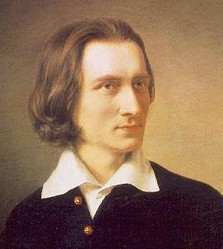




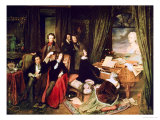
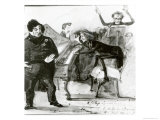
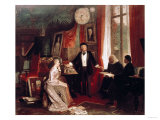




 Ancient Rome: History and Heritageon 02/28/2012
Ancient Rome: History and Heritageon 02/28/2012
 Ancient Greece: History and Heritageon 10/14/2012
Ancient Greece: History and Heritageon 10/14/2012
 Schumann: The Genius Who Composed Scenes From Childhoodon 04/29/2012
Schumann: The Genius Who Composed Scenes From Childhoodon 04/29/2012
 Mahler: The Genius Who Composed the Resurrection Symphonyon 03/04/2012
Mahler: The Genius Who Composed the Resurrection Symphonyon 03/04/2012

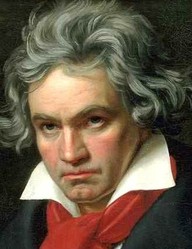
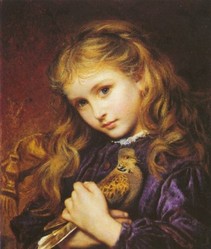
Comments
Liszt is one of favorites. I like his music with ethnic elements best. Applause!
Some great finger gymnastics from the pianist performing La Campanella!